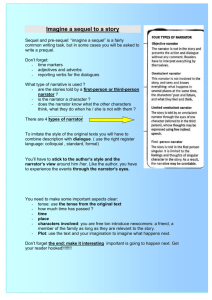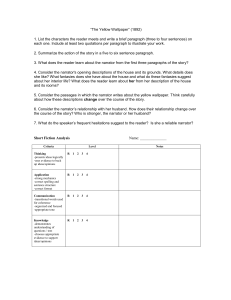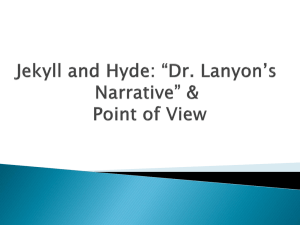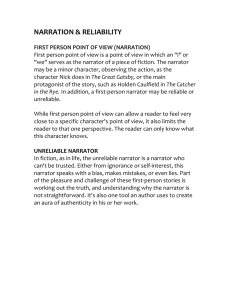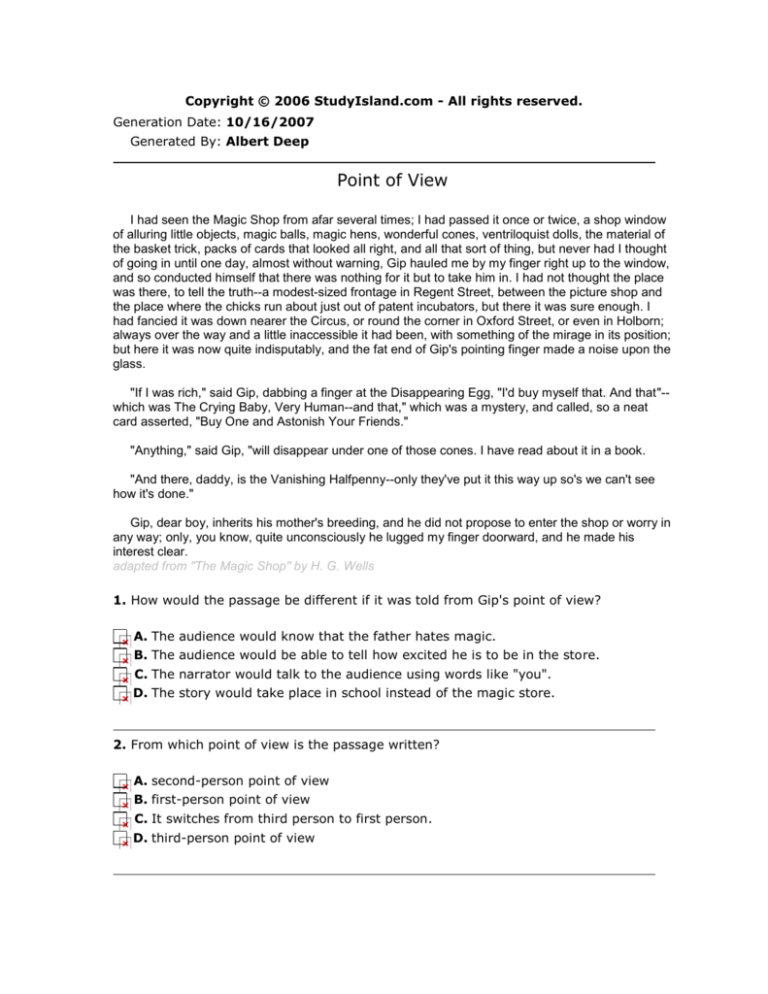
Copyright © 2006 StudyIsland.com - All rights reserved.
Generation Date: 10/16/2007
Generated By: Albert Deep
Point of View
I had seen the Magic Shop from afar several times; I had passed it once or twice, a shop window
of alluring little objects, magic balls, magic hens, wonderful cones, ventriloquist dolls, the material of
the basket trick, packs of cards that looked all right, and all that sort of thing, but never had I thought
of going in until one day, almost without warning, Gip hauled me by my finger right up to the window,
and so conducted himself that there was nothing for it but to take him in. I had not thought the place
was there, to tell the truth--a modest-sized frontage in Regent Street, between the picture shop and
the place where the chicks run about just out of patent incubators, but there it was sure enough. I
had fancied it was down nearer the Circus, or round the corner in Oxford Street, or even in Holborn;
always over the way and a little inaccessible it had been, with something of the mirage in its position;
but here it was now quite indisputably, and the fat end of Gip's pointing finger made a noise upon the
glass.
"If I was rich," said Gip, dabbing a finger at the Disappearing Egg, "I'd buy myself that. And that"-which was The Crying Baby, Very Human--and that," which was a mystery, and called, so a neat
card asserted, "Buy One and Astonish Your Friends."
"Anything," said Gip, "will disappear under one of those cones. I have read about it in a book.
"And there, daddy, is the Vanishing Halfpenny--only they've put it this way up so's we can't see
how it's done."
Gip, dear boy, inherits his mother's breeding, and he did not propose to enter the shop or worry in
any way; only, you know, quite unconsciously he lugged my finger doorward, and he made his
interest clear.
adapted from "The Magic Shop" by H. G. Wells
1. How would the passage be different if it was told from Gip's point of view?
A. The audience would know that the father hates magic.
B. The audience would be able to tell how excited he is to be in the store.
C. The narrator would talk to the audience using words like "you".
D. The story would take place in school instead of the magic store.
2. From which point of view is the passage written?
A. second-person point of view
B. first-person point of view
C. It switches from third person to first person.
D. third-person point of view
The Whale Sound
“Leave him alone!” I yelled, running out of the orphanage. Two bullies were pushing the deaf kid
around. I didn’t know the boy, but I had seen him on his front porch, making hand movements.
The deaf kid made hand signals while the bigger bully pushed him to the ground. The deaf boy’s
body started shaking. He curled up into a ball, shielding his face. He looked like he was about to cry.
I ran back and grabbed my hand-made bow and four arrows. I came back with an arrow cocked
in the bow. The bigger bully ran up and kicked the deaf boy in the middle of the back. The boy jerked
and made a sound like a whale in pain. I fired my arrows at them as they ran away.
I helped the boy back to his house. His sister met us and told me that her brother could not say or
hear anything. I told her he made a sound when the bully kicked him. She said he could not make
sounds because his vocal cords had been removed during a surgery.
The boy made a hand sign at me. His sister told me that he was saying he loved me. I didn’t say
anything. People can’t talk with their hands. Almost every week I saw the boy making the same hand
sign at me. I waved back at him each time.
On my last day at the orphanage, the police came to take me to the reform school. I made a dash
for the fence. I saw the boy on his porch as the police pulled me from the fence. The boy ran across
the road, placed his fingers through the fence, and watched.
They dragged me to the police car. All I could hear was the whale sound the boy made. As we
pulled away, I saw him slide to the ground. He lowered his head into the leaves and pine straw. That
is when I realized he probably did love me. He wanted to save me because he thought I was making
that sound, too.
adapted from "The Whale Sound" by Roger Dean Kiser
3. From what point of view is the story told?
A. Third person omniscient
B. Second person
C. Third person limited
D. First person
4. Who is the narrator referring to when he states, "That is when I realized he probably
did love me. He wanted to save me because he thought I was making that sound,
too"?
A. The deaf boy
B. One of the bullies
C. Himself
D. The police officer
I was the first one to drive a convertible on my reservation. And of course it was red, a red Olds. I
owned that car along with my brother Henry Junior. We owned it together until his boots filled with
water on a windy night and he bought out my share. Now Henry owns the whole car, and his
youngest brother Lyman (that's myself), Lyman walks everywhere he goes.
How did I earn enough money to buy my share in the first place? My own talent was I could
always make money. I had a touch for it, unusual in a Chippewa. From the first I was different that
way, and everyone recognized it. I was the only kid they let in the American Legion Hall to shine
shoes, for example, and one Christmas I sold spiritual bouquets for the mission door to door. The
nuns let me keep a percentage. Once I started, it seemed the more money I made the easier the
money came. Everyone encouraged it. When I was fifteen I got a job washing dishes at the Joliet
Cafe, and that was where my first big break happened.
It wasn't long before I was promoted to busing tables, and then the short-order cook quit and I
was hired to take her place. No sooner than you know it I was managing the Joliet. The rest is
history. I went on managing. I soon became part owner, and of course there was no stopping me
then. It wasn't long before the whole thing was mine.
adapted from "The Red Convertible" by Louise Erdrich
5. From which point of view is the passage written?
A. first-person point of view
B. third-person point of view
C. second-person point of view
D. It switches from third person to first person.
6. Which statement from the passage shows the narrator talking about himself in the
third-person point of view?
A. I soon became part owner, and of course there was no stopping me then.
B. We owned it together until his boots filled with water on a windy night and he
bought out my share.
C. My own talent was I could always make money. I had a touch for it, unusual in
a Chippewa.
D. Now Henry owns the whole car, and his youngest brother Lyman (that's
myself), Lyman walks everywhere he goes.
You say you are ready for the competition. You say you have trained. You say you have
practiced. You've gone over each scenario. What you haven't thought about is the outcome if you
lose.
Based upon this, I think you are not as prepared as you think. I see you going into the match
calm, cool, and collected. I figure that your opponent is too humble to try and get in your head by
talking trash. The biggest thing I sense is that I think since you have never experienced a loss it
could get stuck in your head. However, I think this is a good thing. Since you have never lost, you
don't know how it feels. I was once undefeated too. I fought 10 men over a year, and each match I
was perfect. Then, I got sloppy. There's one thing you should know—everybody loses. I was so
worried about losing that it got in my head too. That's the worst thing because it becomes like a
pebble in your shoe. It's distracting. So, the best thing to do is not wear shoes. Eliminate the
distraction.
That was the last thing my father told me before my fight. He was my coach and trainer from the
time I was six. Eliminate the distraction. It was easy for him to say. I had already gone on to beat his
college record with fewest losses. Somewhere inside, I think he wanted me to lose.
adapted from "Fighter First" by c.safos
7. How would the passage be different if it was told from the third-person point of
view?
A. There would be no setting for the story.
B. The reader might get a better sense of the setting.
C. The fighter would lose the competition.
D. The fighter would be the only point of view the story is told from.
8. How would the passage be different if it was told just from the second person-point
of view?
A. The audience would know how much the father wants his son to win the
competition.
B. The audience would know the father wants to compete.
C. A character would be eliminated from the story.
D. The main character would win his competition.
9. From which point of view is the passage written?
A. third-person point of view
B. first-person point of view
C. It switches from second person to first person-point of view.
D. second-person point of view
This is what I had feared more than anything. This. All this snow. I knew it was coming, but I
thought I had at least a two hour head-start on it.
Now it gathers around me like water around an island.
It packs in my shoes, but I can't feel it. It has melted to water in my boots. My pack is wet too. All
of the matches I had to start a fire are now wet pieces of paper. I haven't even had any water since
my canteen iced over and I couldn't open it.
Bradley tries his best to keep up, but I know he is struggling. Right now, he is ten feet behind me.
When we started the hike for help, we were walking side by side.
I need him to hurry. I don't know how much longer I can stay here in the cold. I'm scared to take
off my boot. I once saw a photo of a man with frostbite on his hands. His fingers looked like charcoal.
They were black and thin and bony. If death had hands they would probably look like that. I imagined
that's what my feet looked like, like I had stepped in tar or molasses.
adapted from "Frostbitten" by c.safos
10. From which point of view is the passage written?
A. first-person point of view
B. It switches from third person to first person.
C. third-person point of view
D. second-person point of view
11. How would the passage be different if it was told from the third-person point of
view?
A. The reader might know about Bradley's inner thoughts as well as the
narrator's.
B. The reader might only get a description of the kind of clothes Bradley wears.
C. The reader would only know Bradley's inner thoughts.
D. The reader would not know where the setting of the story takes place.
Unjustified Fears
I'm not very sociable, and often I forget about my friends. After letting two years go by, on one of
those January days in 1979--they're so hot--I went to visit a friend who suffers from somewhat
unjustified fears. His name doesn't matter; let's call him--just call him--Enrique Viani.
On a certain Saturday in March, 1977, his life changed course.
It seems that, while in the living room of his house, near the door to the balcony, Enrique Viani
saw, suddenly, an "enormous"--according to him--spider on his right shoe. No sooner had he had
the thought this was the biggest spider he'd seen in his life, when, suddenly leaving its place on his
shoe, the animal slipped up his pants leg between the leg and the pants.
Enrique Viani was--he said--"petrified." Nothing so disagreeable had ever happened to him. At
that instant he recalled two things he had read somewhere or other, which were: 1) that, without
exception, all spiders, even the smallest ones, carry poison, and can inject it; and, 2) that spiders
only sting when they feel attacked or disturbed. It was plain to see, that huge spider must surely
have plenty of poison in it, the full strength toxic type. So, Enrique Viani thought the most sensible
thing to do was hold stock still, since at the least move of his, the insect would inject him with a
definitive dose of deadly poison.
So he kept rigid for five or six hours, with the reasonable hope that the spider would eventually
leave the spot it had taken up on his right shin; clearly, it couldn't stay too long in a place where it
couldn't find any food.
As he came up with this optimistic prediction, he felt that, indeed, the visitor was starting to move.
It was such a bulky, heavy spider that Enrique Viani could feel--and count--the footfalls of the eight
feet--hairy and slightly sticky--across the goose flesh of his leg. But, unfortunately, the guest was not
leaving; instead, it nested, with its warm and throbbing head and abdomen, in the hollow we all have
behind our knees.
I was called over by his wife Graciela. When I arrived, I managed to keep myself calm. Then I told
Enrique Viani that if he agreed to my plan, I could make quick work of the invading spider. Opening
his mouth just the least bit, so as not to send the slightest quiver through his leg muscle, Enrique
Viani wondered:
"What plan?"
I explained. I'd take a razor blade and make a vertical slit downwards in his pants leg till I came to
the spider, without even touching it. Once this was done, it would be easy for me to hit it with a
rolled-up newspaper, knock it to the floor and then kill it or catch it.
"No, no," muttered Enrique Viani, desperate, but trying to restrain himself. "The pants leg will
move and the spider will sting me. No, no, that's a terrible idea."
Stubborn people drive me up the wall. Without boasting, I can say my plan was perfect, and here
this wretch who'd made me miss my siesta just up and rejects it, for no serious reason and, to top it
off, he's snotty about it.
"Then I don't know what on earth we'll do," said Graciela. "And just tonight we have Patricia's
fifteenth birthday party ..."
"I've got an idea!" exclaimed Claudia, the little sister. "We can call Don Nicola and ..."
I want it clear that I wasn't exactly wild about Claudia's plan and had nothing to do with its being
adopted. In fact, I was dead set against it. But everyone else was heartily in favor of it and Enrique
Viani was more enthusiastic than anyone.
adapted from "Unjustified Fears" by Fernando Sorrentino, translated by Clark M.
Zlotchew
12. From what point of view is the story told?
A. First person with shifts to third person limited
B. Third person limited
C. First person with shifts to second person
D. Third person limited with shifts to third person omniscient
13. Who is speaking in the following sentence, "Once this was done, it would be easy
for me to hit it with a rolled-up newspaper, knock it to the floor and then kill it or
catch it"?
A. Enrique Viani
B. Graciela Viani
C. The narrator
D. Claudia Viani
14. What is the greatest effect of the author’s shifting the point of view from first
person to third person?
A. It makes Enrique’s family seem cold since they don’t really care about Enrique.
B. It shows that the narrator isn’t as close to Enrique as he thought since Enrique
doesn’t take his advice.
C. It makes Don Nicola come off as the protagonist since he comes up with a
solution on which everyone agrees.
D. It makes the audience aware of the narrator’s thoughts and actions, as well as
Enrique’s thoughts and actions.
Every week, the accounting staff of Morrow, Miser, Mastrel, and Max sat in the cafeteria and
watched the other employees of the company walk in. They walked in like zombies, shuffling their
feet to the lunch line and then to the tables.
The accountants would point, makes jokes, and laugh at the expense of other departments. It
was like being in high school with a bunch of popular kids picking on the less-popular kids—only all
the popular kids wore suits.
Then, one day, as the accountants did their impression of Mandy, a phone operator, one of them
noticed a new employee.
"Chris, get a look at this one," Barry said.
"He must be new," Chris responded.
The new employee had a bit of pep in his step. He almost seemed to glide across the cafeteria
floor effortlessly. It was even more apparent because of everyone else's body language.
The new employee didn't even wait in line. He brought his own lunch and sat down by himself.
Barry and Chris both got frustrated. They were used to seeing everyone except for themselves
miserable. They decided to confront the new guy.
The new guy sat and ate an apple. He stared off into the glass and warmed himself on the sun
creeping into the cafeteria. He placed his hand on the table and fumbled around trying to find an
apple.
Just then, Barry and Chris sat down in front of the new guy. "Well, well, well, Barry, if it isn't a new
guy," Chris said. The new guy immediately turned to face Barry and Chris, his eyes still focused on
the sun.
"Hello, my name's Francis," said the new guy.
"Well Francis, what's the matter, can't you pay attention while we're talking to you?" said Barry.
"Actually, I'm blind," Francis responded, "If I don't pay attention, it's probably because I can't see
you."
All at once, the cafeteria seemed to stop. Barry and Chris immediately sulked in their seats.
adapted from "First-Day Jitters" by c.safos
15. From which point of view is the passage written?
A. third-person point of view
B. It switches from third person to first person.
C. second-person point of view
D. first-person point of view
Answers
1. B
2. B
3. D
4. A
5. A
6. D
7. B
8. C
9. C
10. A
11. A
12. A
13. C
14. D
15. A
Explanations
1. There are many unknowns when it comes to speculating about a story, so you
have to go with what is more likely or unlikely to happen. In this case, what is
known is the reaction of Gip. Gip seems way more interested in the shop than his
father. You can probably guess that if the story were told from Gip's point of
view, the reader would be able to see how excited he is about the magic store
and why store excites him.
2. The passage is written from the first-person point of view. The reader only gets
information from the narrator, who we know is a father. You can tell it's written
in first person by the use of the pronouns "I" and "me".
3. The story is told from the narrator's point of view. He uses the first-person
pronoun "I", and that's how you can tell this is told in the first person. We see
things from his point of view as if we were him. By putting it in the first person,
the audience learns about only the things the narrator knows and feels.
4. Look to earlier in the story to find the correct answer. Earlier, when the deaf boy
is being beaten up, the narrator states that the deaf boy made a sound like a
whale in pain when the bullies were beating him up. At the end of the story, he
goes back to that incident to show that he and the deaf boy have something in
common.
5. The passage is written from the first-person point of view. The reader only gets
information from the narrator, Lyman. You can tell it's written in first person by
the use of the pronouns "I" and "me".
6. The biggest clue that this sentence is written from the third person is that Lyman
actual says his own name in reference to himself. He clears it up by saying,
"that's myself," but he still calls himself by his own name in this sentence.
7. There are many unknowns when it comes to speculating about a story, so you
have to go with what is more likely or unlikely to happen. In this case, what is
know is that there are many students. In fact, there are 10. With so many
characters, it may be hard for the reader to keep track of which character is
which. If the story was told from the first-person perspective, it might focus
strictly on one character and his/her thoughts and feelings, and that character
would be the narrator. With the third person, the reader gets a better sense of
multiple characters as well as the setting and conflicts.
8. Since second person addresses the audience directly, it makes sense that the
interaction would be limited to the father's voice talking to the audience. In that
case, we the audience would actually replace the main character. We would
essentially be the son. By limiting the story to second-person point of view. We
lose the main character of the son, but the audience serves as the son.
9. The story starts out in the second person point of view. The narrator seems to be
talking to the reader. Then, the narrator starts to talk about himself. In the end,
it turns out the narrator is relating a story about his relationship with his father.
The narrator starts out as the father. Then the narrator switches to the son.
10. The passage is written from the first-person point of view. The reader sees
everything through the narrator's eyes. You can tell it's written in first person by
the use of the pronouns "I" and "my".
11. There are many unknowns when it comes to speculating about a story, so you
have to go with what is more likely or unlikely to happen. In this case, it seems
likely that if the story was told from the third-person point of view, especially the
third-person omniscient point of view, the reader might know the narrator's inner
thoughts and Bradley's. Third-person omniscient point of view means that the
reader can know everything happening in the story, from each of the characters.
12. The story is interesting in that it shifts it point of view several times. At one point
the narrator is telling the story form the first person point of view; however,
later, the narrator is able to tell how Enrique feels. This is most evident when the
narrator describes how the spider felt climbing up Enrique’s leg.
13. There are only a few characters in the story, so it’s important to keep track of
who is speaking. In this case, the narrator is speaking, even though five
paragraphs earlier the narrator was describing how Enrique felt as the spider
crawled up his pant leg, and it sounded as if it was Enrique telling the story.
14. The best of effect in switching points of view is that the audience is able to
understand how terrified Enrique is of spiders as well as how frustrated the
narrator is since his friend is petrified by fear. The drawback to shifting points of
view is that sometimes it’s hard to tell who the audience should empathize with
since it can be hard to track who’s speaking.
15. The passage is written from the third-person point of view. The reader sees
everything through the narrator's point of view. The narrator sees everything
that is happening to each character.
Copyright © 2006 StudyIsland.com - All rights reserved.



